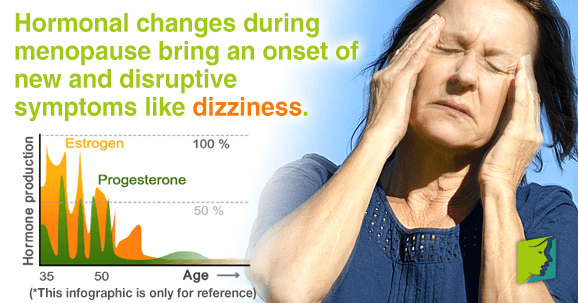Even those who haven't gone through menopause are probably at least familiar with the most well-known symptoms, such as hot flashes and mood swings. Much less talked about, however, are dizziness and loss of balance. Some women may get all the way through menopause without experiencing it, but others are suddenly caught off guard by intense feelings of vertigo and spinning, and they could even fall. Unfortunately, due to the relative elusiveness of the causes, some question whether or not dizziness necessarily happens in conjunction with menopause.
Could Dizziness Be Unrelated to Menopause?
The causes of dizziness are numerous and, just to name a few, they include such ails as:
- Low blood pressure
- Dehydration
- Sitting up too quickly
- Ear infections
- Certain medications
- Low blood sugar
Because there are so many factors in the body that could contribute to feelings of vertigo, pinning down the exact cause can be difficult. Furthermore, it's not a far stretch to assume a woman could be experiencing one of the above issues at the same time that she is going through menopause.
Does Menopause Contribute to Dizziness?
The link between dizziness and menopause hasn't been well-studied, and when it has, the connection isn't nearly as strong or obvious as with other symptoms like night sweats. However, though much more conclusive research is required about why women feel dizzy during menopause, studies show that they are more susceptible during this stage of life. The varying tides of hormonal changes inevitably bring an onset of new and disruptive symptoms, and in recent years, there has been definitive acknowledgement that dizziness is certainly one of them.
Listed below are some of the ways menopause could spark a dizzy spell:
- Fluctuating hormone levels have an inevitable effect on blood pressure, circulation, and the nervous system, which in turn, can cause disorientation and loss of balance.
- Hot flashes, a common menopausal event, increases the heart rate, perspiration, and rate of breathing. Dizziness often comes along with hot flashes, possibly due to the overlapping of all these effects on the body.
- Studies have shown that hormonal fluctuations, such as the ones that occur during menopause, could increase susceptibility of benign paroxysmal positional vertigo (BPPV).
- New studies have also hinted at a higher rate of Meniere's disease - a disorder effecting the inner ear - and subsequently balance in menopausal women.
- Other menopausal symptoms such as migraines, stress, insomnia, or anxiety can also bring on an attack of dizziness.
Dizziness and its related feelings are uncomfortable at best and harmful at worst. Unfortunately, dizziness has multitudinous causes, including menopause, but by arming yourself with knowledge to prepare yourself and tips for preventing it, both physical and mental balance can be restored. Read on about treatments for menopause symptoms.
Sources
- Ogun, O.A. et al. (2014). Menopause and benign paroxysmal positional vertigo. Menopause, 21(8), 886-889. Retrieved from http://www.ncbi.nlm.nih.gov/pubmed/24496089
- Owada, S. et al. (2012). [Clinical evaluation of vertigo in menopausal women.] Nihon Jibiinkoka Gakkai Kaiho, 155(5), 534-539. Retrieved from http://www.ncbi.nlm.nih.gov/pubmed/22686064
- Park, J.H. & Viirre, E. (2010). Vestibular migraine may be an important cause of dizziness/vertigo in perimenopausal period. Medical Hypotheses, 75(5), 409-414. Retrieved from http://www.ncbi.nlm.nih.gov/pubmed/20692105




